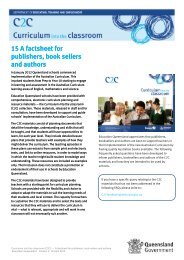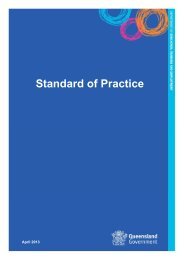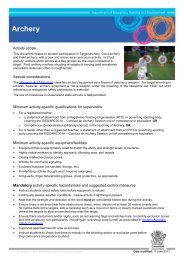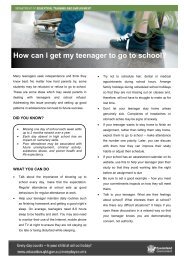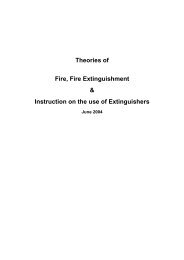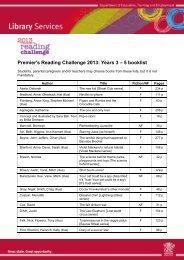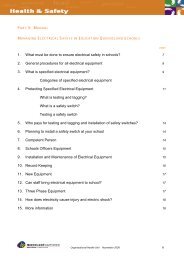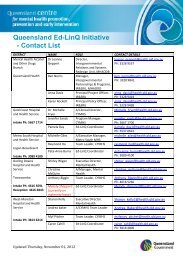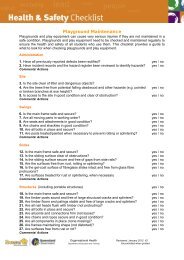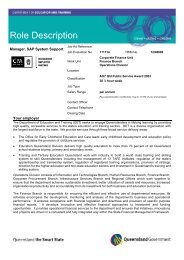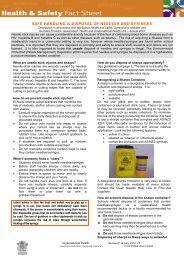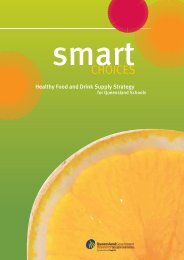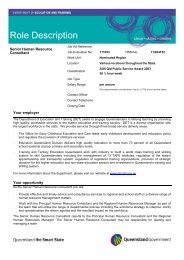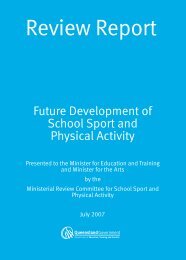Anaphylaxis guidelines for Queensland State Schools - Education ...
Anaphylaxis guidelines for Queensland State Schools - Education ...
Anaphylaxis guidelines for Queensland State Schools - Education ...
Create successful ePaper yourself
Turn your PDF publications into a flip-book with our unique Google optimized e-Paper software.
• Ensure a copy of the student’s Action Plan is posted in the tuckshop <strong>for</strong> tuckshop staff reference with<br />
parental approval or display an Action Plan <strong>for</strong> <strong>Anaphylaxis</strong> (general) poster.<br />
• Discuss strategies <strong>for</strong> food allergens (p.14) and roles and responsibilities of the tuckshop staff (p.25)<br />
with the tuckshop coordinator.<br />
• Ensure school volunteers are in<strong>for</strong>med of relevant risk management in<strong>for</strong>mation.<br />
Communicate with older, more independent students at risk of anaphylaxis<br />
• Meet with the student and relevant staff and encourage the student to:<br />
- communicate details about their allergies and emergency treatment to peers and teachers<br />
- read food labels<br />
- know their own signs and symptoms of an allergic reaction and how to alert school staff of this<br />
immediately<br />
- be familiar with the use of their adrenaline auto-injector<br />
- ensure they have ready access to their adrenaline auto-injector at all times<br />
- ensure their adrenaline auto-injector is within its expiry date.<br />
Communicate with students and the school community<br />
• Ensure all students are aware of the risks associated with anaphylaxis and the unacceptable dangers of<br />
teasing students with their allergic triggers.<br />
• In<strong>for</strong>m the school community about anaphylaxis and offer advice to minimise the risk of students<br />
experiencing anaphylaxis in the school.<br />
Arrange management of medication, equipment and students’ Action Plans<br />
• Ensure that auto-injectors are stored securely in a cool dark location and in accordance with the<br />
manufacturers’ recommendations but readily accessible <strong>for</strong> use if required.<br />
• Ensure that a system is in place <strong>for</strong> the school and the<br />
parent to check the expiry dates of their adrenaline autoinjectors<br />
on a regular basis.<br />
• Review each student’s Action Plan at a specified time (e.g.<br />
beginning of the school year) and at any other time where<br />
there are changes in:<br />
- the student’s health needs<br />
- staff, particularly class teacher, year coordinator or<br />
advisor, or any staff member who has a specific role in<br />
the plan<br />
- other factors that affect the plan, <strong>for</strong> example, when<br />
an allergic reaction or anaphylactic event occurs.<br />
• If students have a medical bracelet or chain, they should<br />
be encouraged to wear it.<br />
Example of school first aid<br />
kit<br />
• Safe disposal of an unused expired adrenaline auto-injector <strong>for</strong> general use is via a pharmacy.<br />
• A student's unused expired adrenaline auto-injector should be returned to the parent.<br />
22 <strong>Anaphylaxis</strong> <strong>guidelines</strong> <strong>for</strong> <strong>Queensland</strong> state schools



